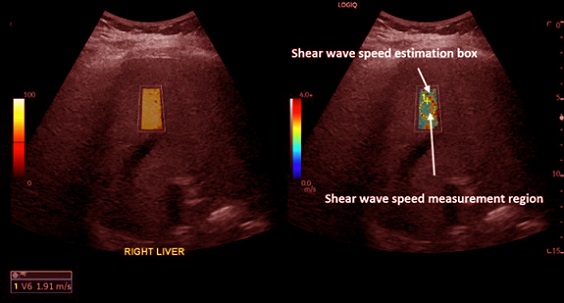Nikhil Prasad Fact checked by:Thailand Medical News Team Nov 17, 2024 1 year, 2 months, 2 weeks, 5 days, 4 hours, 11 minutes ago
Medical News: Researchers from Massachusetts General Hospital-USA and Harvard Medical School-USA have revealed significant insights into long-term liver damage following COVID-19 infection. Utilizing ultrasound shear wave elastography (SWE), the study highlights a notable increase in liver stiffness among post-COVID patients - a potential marker for lingering liver injuries like inflammation or fibrosis.
 COVID-19-Induced Long-Term Liver Injury Uncovered by Ultrasound Technology
COVID-19-Induced Long-Term Liver Injury Uncovered by Ultrasound Technology
This
Medical News report delves into how the pandemic's toll extends beyond acute illness, addressing a previously underexplored area: the liver's health after COVID-19. Researchers analyzed liver stiffness as a proxy for damage, offering a non-invasive method for monitoring post-COVID health.
Exploring Liver Health with Advanced Imaging
The retrospective study categorized 130 participants into three groups: post-COVID patients, contemporaneous unexposed individuals, and pre-pandemic patients. Liver stiffness was assessed through SWE, a cutting-edge ultrasound method. Researchers observed that post-COVID patients exhibited a median liver stiffness of 7.58 kilopascals (kPa), significantly higher than the contemporaneous unexposed group, which averaged 5.99 kPa.
This difference, which persisted even after adjusting for factors like age, sex, body mass index (BMI), and history of chronic liver disease, points to potential long-term hepatic damage. Surprisingly, no significant difference was found between post-COVID patients and pre-pandemic individuals, raising questions about temporal factors affecting liver health.
The Role of COVID-19 in Liver Stiffness
The increased stiffness indicates a higher likelihood of underlying conditions such as liver inflammation or fibrosis, both of which are associated with prolonged liver injury. The findings add to growing evidence that COVID-19 can have chronic effects, even in cases where the initial illness was mild.
Interestingly, the study found no link between the severity of COVID-19 illness and the degree of liver stiffness. This suggests that even patients with mild symptoms could experience long-term liver changes, underscoring the virus's unpredictable impact.
Shedding Light on Non-Invasive Monitoring
The use of SWE offers a significant advantage in detecting liver damage without invasive procedures. By measuring liver tissue stiffness, SWE provides valuable insights into the progression of liver conditions. The study supports SWE as a viable tool for monitoring liver health in patients recovering from COVID-19.
Potential Causes of Liver Damage Post-COVID
The research builds on earlier findings that liver injury during acute COVID-19 could result from direct viral damage, immune responses, or systemic inflammation. The persistence of these effects raises concerns about the broader implications for long-term liver health.
;
Notably, increased BMI was associated with higher liver stiffness, suggesting that weight-related factors may exacerbate liver vulnerability in COVID-19 patients. The findings highlight the need for targeted interventions to address this risk.
Study Limitations and Future Directions
While the study presents groundbreaking findings, it also acknowledges limitations. The retrospective design and small sample size may limit generalizability. Additionally, the lack of histopathologic confirmation leaves questions about the exact nature of liver changes. Future studies with larger cohorts and longitudinal designs will be essential to validate these findings and explore potential treatments.
Conclusion: A Call to Action
This study underscores the importance of monitoring liver health in COVID-19 survivors. Increased liver stiffness, as detected by SWE, points to the possibility of lasting damage, even in cases of mild illness. The findings suggest that routine liver assessments could play a crucial role in managing post-COVID health.
Healthcare providers are encouraged to consider non-invasive tools like SWE for evaluating liver health in patients recovering from COVID-19. The study also highlights the need for lifestyle interventions, such as weight management, to reduce the risk of liver-related complications.
The study findings were published in the peer-reviewed journal: WFUMB Ultrasound Open.
https://www.sciencedirect.com/science/article/pii/S2949668324000429
For the latest COVID-19 News, keep on logging to Thailand
Medical News.
Read Also:
https://www.thailandmedical.news/news/liver-stress-detected-in-mild-and-asymptomatic-omicron-cases
https://www.thailandmedical.news/news/singapore-case-study-reveals-that-even-mild-covid-19-can-trigger-fatal-liver-failure-in-patients-with-autoimmune-liver-disease
https://www.thailandmedical.news/news/covid-19-worsens-existing-liver-disease-and-could-spur-liver-cancer-development
